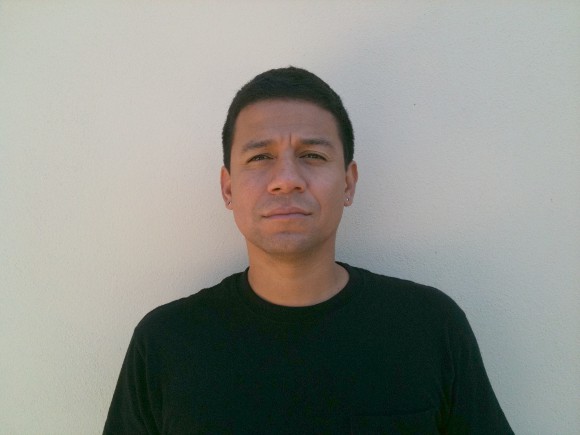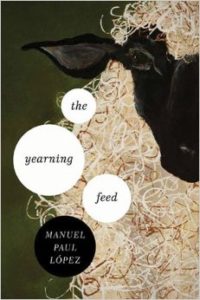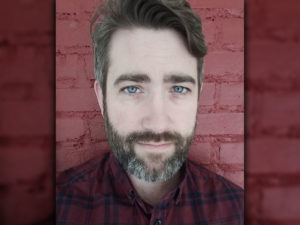
Manuel Paul López is a CantoMundo fellow. He is the author of Death of a Mexican and other Poems and The Yearning Feed. He currently lives in San Diego, California with his wife.
THE XOCO LETTERS
__________
Xoco, I’m obsessed with numbers, statistics, and the diminishing half-life of each new story that announces another nameless immigrant who died crossing the desert.
__________
Dear Xoco,
These mountains are relentless. A scorpion nearly stung me last night. Luckily, Pedro managed to smash it with the stick he’s been carrying to protect us from the coyotes.
__________
Cave Canem!
__________
Xoco,
Since volunteering with the Border Angels, I’ve witnessed two water tanks slashed. One near Jacumba was contaminated with urine. Who would do such a thing, Xoco? Xoco, there is only one thing as unforgiving, and that is thirst.
__________
Run Run se fue p’al Norte
no sé cuando vendrá
—Violeta Parra
__________
(from Yelp Review #3)
Amy S.
Columbus, OH
We filled our glasses with water (your choice of tap or sparkling with slices of lime—classy!) and were seated at our table.
__________
Xoco,
Lucia says scorpions are omens.
__________
Kidnappings, Xoco! Mariana’s sister warned her of kidnappings. There’s a ridge near Tijuana where thugs wait to rob polleros y pollos. Please warn the others to keep safe, to think clearly and to keep their eyes open.
Rodolfo walked his little sister to buy a torta near his family’s home. Out of nowhere, reported Rodolfo, a gunshot was fired. The kids hid behind the loncheria. Rodolfo said his sister was terrified, and that she remains so—the child saw a man murdered, Xoco. Narcos, Rodolfo said. The devastation has reached our family.
__________
Dear Xoco,
Hermana, I hope all is well. My chest is getting stronger. Been doing lots of push-ups. Trying to get in shape. I haven’t been completely sober, but I’m nearly there. Yeah, I’ve been doing a lot of exercises. I actually want to run a marathon. A ver. Let’s see if it happens. Do Latinos even run marathons? Hope all is cool with you. Where are you now, Xoco? Someday I want to send all of these letters to you. I’m not much of a writer, but somehow writing makes me feel better.
Un abrazo,
Tu hermano.
__________
Imperial Valley Press
Undocumented migrants buried in Holtville cemetery
October 25th, 2009—By Silvio J. Panta, Staff Writer
Holtville? Among the first things one notices about Terrace Park Cemetery is the wet soil that was once covered by alkaline.
But it’s toward the back where 508 gravesites for people of limited means are kept, with 271, or 53%, of these graves comprising of U.S. born citizens, said Chuck Jernigan, superindendent of the Central Valley Cemetery District.
But 237 of those gravesites, or 46% of the one-acre area, are made up of John Does, Jane Does or unidentified people. Included in the mix are undocumented immigrants, Jernigan said.
Imperial County pays about $1000 to provide a burial for those too poor to afford it, Jernigan said.
“Every piece of concrete you see, that’s a grave,” said Jernigan of the headstones. “We just had a burial here Thursday.”
Jernigan, a former undersheriff for the Imperial County Sheriff’s Office, has been involved in the cemetery district’s board for 16 years and can’t help but feeling sorrow at the sight of so many anonymous gravesites.
“It’s unfortunate. It’s sad,” he said of the final resting place. “It brings closure to a certain degree.”
Bringing a sense of closure is what Enrique Morones, president of the San Diego-based Border Angels, tries to bring to the graves of those unidentified migrants who lost their lives in years past.
Morones and other Border Angel volunteers plan to come to the cemetery Nov. 2nd to plant small crosses and say a prayer or two for the fallen migrants.
While the migrants have no legal way into the U.S., Morones said, migrants are often forced to make the tough decision of either “starving to death in their own country or take their chances in coming over here.”
Immigrants once had the sight of the Statue of Liberty to greet them when they came into this country, Morones said. Today, it is a different story, he said.
“There is no statue for them,” Morones said. “All they have is a wall.”
__________
+ + +
+
+ + +
+ +
+
+ +
+ + +
+
__________
 Rebecca Schumejda: THE XOCO LETTERS, juxtaposes a collaboration of voices that address a major controversy in this country, which I consider the lack of humanistic responses to the treatment of people. Can you discuss the various perspectives explored and your intention? Can you discuss what inspired you to write THE XOCO LETTERS?
Rebecca Schumejda: THE XOCO LETTERS, juxtaposes a collaboration of voices that address a major controversy in this country, which I consider the lack of humanistic responses to the treatment of people. Can you discuss the various perspectives explored and your intention? Can you discuss what inspired you to write THE XOCO LETTERS?
Manuel Paul López: First, thanks so much for the opportunity and the space to write a few words about this particular poem.
I can’t necessarily call the impetus for THE XOCO LETTERS an inspiration. I think THE XOCO LETTERS was and is a reaction more than anything to the border politics that many times feels devoid of any human compassion. As the politicians in Washington stage their theatrics each session, people are dying in the deserts in very real ways. THE XOCO LETTERS began literally with the email that begins the poem. I found it one day online as I was researching different local humanitarian organizations for another project I was involved with. This particular email was posted on the organization’s website and was identified simply as a message received, along with others from people in support and in opposition of the mission of this group. I was struck immediately by the author’s willingness to advocate violence, but I was especially taken by the author’s suggestion to do harm to some of the most vulnerable among us, calling for an “open season” on those who clandestinely cross the border. Not only is this repulsive, but it is far more common than we might think. (We must not forget a certain Republican presidential candidate who suggested employing electrical fences to support better border security. He later called his statement a joke and apologized, but the damage was done.) After reading the email, I wondered about the note’s authenticity? Was it a gag? Was it propaganda? Or was it really the seething hatred of a racist psychopath? Nonetheless, I copied and pasted the letter into a Word Document and saved it on my desktop, opening it periodically over a year or two when I felt its tug. When you combine something like this with the constant vitriol in the comment streams that follow articles about immigration and immigration reform, it’s hard to stay composed and compliant, especially after the recent $46 billion dollar proposal to militarize the border with Mexico.
If I had it my way, THE XOCO LETTERS would read like a Google search, because that’s really what it is. It’s one person engaging torrents of information online and being affected by it.
RS: Why did you decide to include the yelp reviews of XOCO?
MPL: Including the Yelp reviews in the poem was literally a result of having searched for things to do while in Chicago during one summer. I’ve enjoyed Rick Bayless’ PBS series Mexico: One Plate at a Time, so when his new restaurant at the time XOCO popped up in the search, I was curious to read more. I especially took interest, though, in the name of the restaurant, which I learned shortly after meant “little sister” in Nahuatl. I remember thinking to myself at the time: “Wow, what a beautiful name.” I must admit, I obsessed over it for some time, completely enamored with the sound of the word, and the associations that began to take shape. In the XOCO LETTERS, XOCO is the figure addressed, where various speakers ask for her guidance, support and love. After a quick Wikipedia search on Rick Bayless, I also learned he had completed some doctoral work in anthropological linguistics, which only added to the intrigue.
The planning of my trip to the city coincided with a number of border-related materials I was reading and watching at the time. This was also during the controversy surrounding Arizona’s SB1070, so my nerves were exposed and rubbed raw by some of the commentary I was catching in the media. In time, I started to think about how my online searches during this period, in addition to my other preoccupations might look if they were static instead of just a bunch of fleeting online activity, an act that says a lot in itself, no? I mean if you’d ask me to list ten topics I searched for on the Internet yesterday, I’d probably be able to name three tops, though I’m sure my browser would report hundreds. From silly, offensive and often times, clever YouTube comments, to endless Yelp reviews on places I’d never visit or eat, the information and time wasted is incalculable, but most frightening, irretrievable. When I paused things for a bit, I started to think and react to how the Yelp reviews behaved next to some of the other documents I had copied and pasted into an ongoing Word Document. After a while, I began to ask myself:What does this mean? What does this reveal?
RS: Can you discuss the significance of the + poem?
MPL: The first time the + [crucifix] graphic in THE XOCO LETTERS is introduced is immediately following the Imperial Valley Press article by Silvio J. Panta entitled “Undocumented Buried in Holtville Cemetery.” As reported in the article, a section of the Terrace Park Cemetery in Holtville, California is designated for John and Jane Does, or unidentified people who died in the desert. As expected, a large percentage of those buried in this section (in the back) are undocumented migrants who could not be identified and therefore could never be returned to their families. I’ve been to this cemetery, and it’s overwhelming. Small wooden crucifixes have now been placed next to the original small rectangular concrete slabs that are neatly lined up to indicate that people have been buried there. The Border Angels is an organization that has provided these crucifixes; unfortunately, due to the continued deaths in the desert, they must continue to do so.
[AMAZONPRODUCTS asin=”0971960798″]




